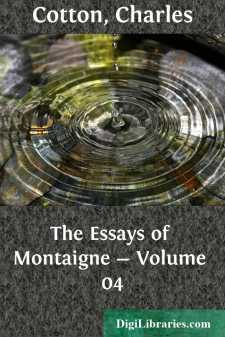Literary Collections
- American 84
- Ancient, Classical & Medieval 14
- Asian 1
- Australian & Oceanian 1
- Canadian 55
- Continental European 121
- English, Irish, Scottish, Welsh 179
- Essays 160
- General 24
- Letters 46
- Middle Eastern 1
Literary Collections Books
Sort by:
by:
Charles Cotton
He seems to me to have had a right and true apprehension of the power of custom, who first invented the story of a country-woman who, having accustomed herself to play with and carry a young calf in her arms, and daily continuing to do so as it grew up, obtained this by custom, that, when grown to be a great ox, she was still able to bear it. For, in truth, custom is a violent and treacherous...
more...
by:
Charles Cotton
DEFENCE OF SENECA AND PLUTARCH The familiarity I have with these two authors, and the assistance they have lent to my age and to my book, wholly compiled of what I have borrowed from them, oblige me to stand up for their honour. As to Seneca, amongst a million of little pamphlets that those of the so-called reformed religion disperse abroad for the defence of their cause (and which sometimes proceed...
more...
by:
Charles Cotton
Well, but some one will say to me, this design of making a man's self the subject of his writing, were indeed excusable in rare and famous men, who by their reputation had given others a curiosity to be fully informed of them. It is most true, I confess and know very well, that a mechanic will scarce lift his eyes from his work to look at an ordinary man, whereas a man will forsake his business...
more...
by:
Charles Cotton
By how much profitable thoughts are more full and solid, by so much are they also more cumbersome and heavy: vice, death, poverty, diseases, are grave and grievous subjects. A man should have his soul instructed in the means to sustain and to contend with evils, and in the rules of living and believing well: and often rouse it up, and exercise it in this noble study; but in an ordinary soul it must be...
more...
by:
Charles Cotton
A CONSIDERATION UPON CICERO One word more by way of comparison betwixt these two. There are to be gathered out of the writings of Cicero and the younger Pliny (but little, in my opinion, resembling his uncle in his humours) infinite testimonies of a beyond measure ambitious nature; and amongst others, this for one, that they both, in the sight of all the world, solicit the historians of their time not...
more...
by:
Charles Cotton
OF WAR HORSES, OR DESTRIERS I here have become a grammarian, I who never learned any language but by rote, and who do not yet know adjective, conjunction, or ablative. I think I have read that the Romans had a sort of horses by them called 'funales' or 'dextrarios', which were either led horses, or horses laid on at several stages to be taken fresh upon occasion, and thence it is...
more...
by:
Charles Cotton
THE CEREMONY OF THE INTERVIEW OF PRINCES There is no subject so frivolous that does not merit a place in this rhapsody. According to our common rule of civility, it would be a notable affront to an equal, and much more to a superior, to fail being at home when he has given you notice he will come to visit you. Nay, Queen Margaret of Navarre—[Marguerite de Valois, authoress of the...
more...
by:
Charles Cotton
When we judge of another's assurance in death, which, without doubt, is the most remarkable action of human life, we are to take heed of one thing, which is that men very hardly believe themselves to have arrived to that period. Few men come to die in the opinion that it is their latest hour; and there is nothing wherein the flattery of hope more deludes us; It never ceases to whisper in our ears,...
more...
by:
Charles Cotton
CHAPTER I OF THE INCONSTANCY OF OUR ACTIONS Such as make it their business to oversee human actions, do not find themselves in anything so much perplexed as to reconcile them and bring them into the world's eye with the same lustre and reputation; for they commonly so strangely contradict one another that it seems impossible they should proceed from one and the same person. We find the younger...
more...
by:
Charles Cotton
CHAPTER I OF PROFIT AND HONESTY No man is free from speaking foolish things; but the worst on't is, when a man labours to play the fool: "Nae iste magno conatu magnas nugas dixerit." ["Truly he, with a great effort will shortly say a mighty trifle." —-Terence, Heaut., act iii., s. 4.] This does not concern me; mine slip from me with as little care as they are...
more...











